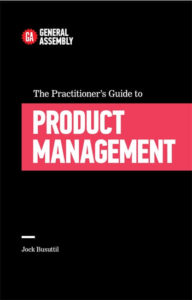
PRODUCTHEAD: Good product managers are catalysts
PRODUCTHEAD is a regular newsletter of product management goodness,
curated by Jock Busuttil.
okr computer #
every PRODUCTHEAD edition is online for you to refer back to
tl;dr
Good product managers amplify the ability of an organisation to generate value
Successful companies have figured out how to align quality, customer value, and sustainable velocity
With no formal entry requirements, many people have piled in to product management with little care for the craft
hello
The discourse recently has been whether product managers are even necessary in an organisation. The reason for the question is understandable given the layoffs happening right, left and centre at the moment, albeit uncomfortable. After all it’s often more persuasive to point to a tangible output and say, “I made that,” than it is to point to an outcome and say that you indirectly influenced a bunch of people to cause that to happen.
This is why I love good analogies. They help me to explain an idea, even if they’re not perfect.
In chemistry, a catalyst is a substance that increases the rate of a chemical reaction, yet is not used up by that reaction. The word ‘catalyst’ comes from the ancient Greek word καταλύειν (kata-loo-ayn), meaning to loosen or untie. (Yay Classics)
I think good product managers are like catalysts. They increase the rate at which an organisation delivers a successful product (= valued by customers), despite not being the people designing, coding or deploying the product itself. They work with people across the organisation to loosen the constraints that may be slowing things down.
Catalysts work by lending themselves to the chemical reaction, allowing it to follow an alternate path that results in the same outputs, but quicker. And as a handy by-product of this shortcut, the original catalyst is regenerated — or ‘paid back’ if you prefer.
To stretch the analogy a little further: like catalysts, product managers invest themselves — their skills, knowledge, intuition, general good attitude, whatever — into the process of creating a successful product. Everyone involved then follows a different set of steps to get to the desired result at a faster rate. But the product manager doesn’t lose anything in the process. They still retain their skills, knowledge and hopefully their good attitude.
It may be uncharitable to say so, but the organisations who have laid off ineffective product managers will probably not notice any significant change. Things may even improve slightly for them. This is why I think the current layoffs are particularly brutal — good and bad product managers alike are being let go indiscriminately. Everyone’s being tarred with the same brush.
But the ones who fired a good product manager may gradually start to wonder why product delivery is becoming slower, and why new features aren’t adding any value (if they’re even bothering to check), and why the development teams are becoming demoralised after having to react to yet another great idea the CEO had in the shower that morning.
Just as a chemical reaction can still proceed without a catalyst, it is perfectly possible for a team to get to a successful product without a product manager. Before product managers became common in tech companies, many were practising product management in all but name, with the function spread over several people.
But without even that happening, in other words no product management at all, yes, a company really could create a successful product. It was just more hit and miss. And with every company in the same situation, the playing field in this regard was level.
This is why I like the catalyst analogy: with a good product manager, an organisation dramatically increases its odds of creating a successful product (= valued by customers) and can get there far more quickly than without. When all your competitors have a low success rate and are slow to market, having a good product manager is a valuable competitive advantage.
For you this week #
In his article, Rich Mironov describes the value product managers add and the misconceptions CEOs have about that.
John Cutler assesses what slows down a company, distilling the reason to survival, gluttony and mismatched mental models.
And lastly, Paul Jackson makes an astute assessment of why the current job market correction is both explicable and beneficial to the craft in the long run.
Speak to you soon,
Jock
what to think about this week
How product can (and can’t) speed up development
Half of the calls I get from CEOs include requests for Product Management to boost productivity in Maker teams (aka Engineering aka Development aka R&D). To ship more stuff, faster. To hit more roadmap dates. To reduce some fictitious cost-per-feature financial goal. To get more for less.
This reflects confusion about what product managers do (and how we really add value), and often poor role definition where product managers are also project/program managers or engineering leads.
Product managers chase value, not process speed
[Rich Mironov / Mironov Consulting]
What slows us down
If speed is so important, why do most companies go so slow? I have concluded that it boils down to one (or all) of these problems:
- They go fast to survive (and then go slow)
- Gluttony—things go too well, and then don’t
- A mental model mismatch
People need to experience a better way of working before they understand it
[John Cutler / The Beautiful Mess]
Do we really need product managers?
Payscale’s research found that a striking 66% of Senior Product Managers were planning to quit due to a combination of factors including job insecurity, return-to-office mandates and stressful work environments.
High profile layoffs across the tech sector in general have also played a role.
This should not come as a surprise. In fact, it’s predictable and, I would argue, necessary.
The key is in the word ‘manager’
[Paul Jackson / Oliver Bernard]
recent posts
Moving up to a CPO or VP Product role
Stepping up to a Chief Product Officer (CPO) or VP Product role doesn’t so much change what you do. Rather it amplifies everything. This guide lets you know what to expect.
Liberating and terrifying in equal measure
[I Manage Products]
I want to update my pricing strategy. Where do I start?
“My product currently has one tier of per-seat pricing for all customers. I want to change my pricing strategy to cater differently for SMEs and enterprise customers. Where do I start?”
A few pricing concepts to consider + further reading
[I Manage Products]
How do I make my product roadmap a better communication tool?
“My product roadmap is not getting the right information across to other people in my company. In particular, my customer success and marketing teams are struggling to plan their work for upcoming product releases. I’m also not sure how I can show my roadmap’s relationship to the half-yearly OKRs we set. How can I improve it?”
Your product roadmap is a communication tool
[I Manage Products]
can we help you?
Product People is a product management services company. We can help you through consultancy, training and coaching. Just contact us if you need our help!
Helping people build better products, more successfully, since 2012.
PRODUCTHEAD is a newsletter for product people of all varieties, and is lovingly crafted from a beginner’s drawing course.


Leave a Reply